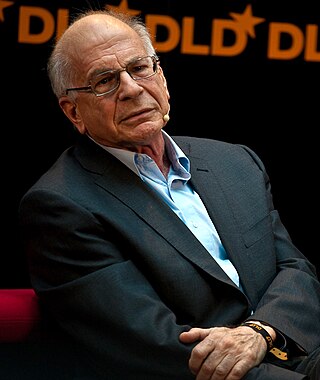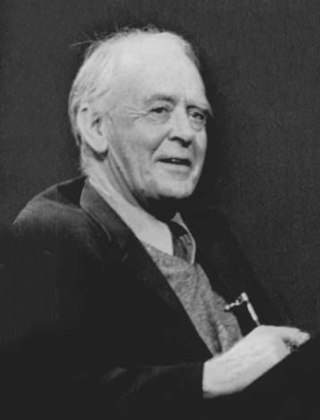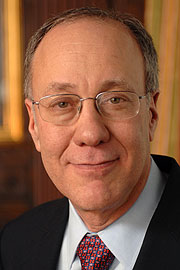Related Research Articles
Rational choice theory refers to a set of guidelines that help understand economic and social behaviour. The theory originated in the eighteenth century and can be traced back to the political economist and philosopher Adam Smith. The theory postulates that an individual will perform a cost–benefit analysis to determine whether an option is right for them. Rational choice theory looks at three concepts: rational actors, self interest and the invisible hand.
In economics, utility is a measure of the satisfaction that a certain person has from a certain state of the world. Over time, the term has been used in at least two different meanings.

Kenneth Joseph Arrow was an American economist, mathematician, writer, and political theorist. Along with John Hicks, he won the Nobel Memorial Prize in Economic Sciences in 1972.

Daniel Kahneman was an Israeli-American cognitive scientist best-known for his work on the psychology of judgment and decision-making. He is also known for his work in behavioral economics, for which he was awarded the 2002 Nobel Memorial Prize in Economic Sciences together with Vernon L. Smith. Kahneman's published empirical findings challenge the assumption of human rationality prevailing in modern economic theory. Kahneman became known as the "grandfather of behavioral economics."

Sir John Richard Hicks was a British economist. He is considered one of the most important and influential economists of the twentieth century. The most familiar of his many contributions in the field of economics were his statement of consumer demand theory in microeconomics, and the IS–LM model (1937), which summarised a Keynesian view of macroeconomics. His book Value and Capital (1939) significantly extended general-equilibrium and value theory. The compensated demand function is named the Hicksian demand function in memory of him.

Decision theory is a branch of applied probability theory and analytic philosophy concerned with the theory of making decisions based on assigning probabilities to various factors and assigning numerical consequences to the outcome.

In economics, a cardinal utility function or scale is a utility index that preserves preference orderings uniquely up to positive affine transformations. Two utility indices are related by an affine transformation if for the value of one index u, occurring at any quantity of the goods bundle being evaluated, the corresponding value of the other index v satisfies a relationship of the form
Social choice theory or social choice is a branch of welfare economics that analyzes mechanisms and procedures for collective decision-making. Social choice incorporates insights from economics, mathematics, and game theory to find the best ways to combine individual opinions, preferences, or beliefs into a single coherent measure of the quality of different outcomes, called a social welfare function.
In decision theory, the Ellsberg paradox is a paradox in which people's decisions are inconsistent with subjective expected utility theory. John Maynard Keynes published a version of the paradox in 1921. Daniel Ellsberg popularized the paradox in his 1961 paper, "Risk, Ambiguity, and the Savage Axioms". It is generally taken to be evidence of ambiguity aversion, in which a person tends to prefer choices with quantifiable risks over those with unknown, incalculable risks.
In decision theory and economics, ambiguity aversion is a preference for known risks over unknown risks. An ambiguity-averse individual would rather choose an alternative where the probability distribution of the outcomes is known over one where the probabilities are unknown. This behavior was first introduced through the Ellsberg paradox.

Eric Stark Maskin is an American economist and mathematician. He was jointly awarded the 2007 Nobel Memorial Prize in Economic Sciences with Leonid Hurwicz and Roger Myerson "for having laid the foundations of mechanism design theory". He is the Adams University Professor and Professor of Economics and Mathematics at Harvard University.

Roger Bruce Myerson is an American economist and professor at the University of Chicago. He holds the title of the David L. Pearson Distinguished Service Professor of Global Conflict Studies at The Pearson Institute for the Study and Resolution of Global Conflicts in the Harris School of Public Policy, the Griffin Department of Economics, and the college. Previously, he held the title The Glen A. Lloyd Distinguished Service Professor of Economics. In 2007, he was the winner of the Sveriges Riksbank Prize in Economic Sciences in Memory of Alfred Nobel with Leonid Hurwicz and Eric Maskin for "having laid the foundations of mechanism design theory." He was elected a Member of the American Philosophical Society in 2019.
David Michael Garrood Newbery, CBE, FBA, is a British economist who has been Professor of Applied Economics at the University of Cambridge since 1988. He specialises in the field of energy economics, and he writes on the regulation of electricity markets. His interests also include climate change mitigation and environmental policy, privatisation, and risk.

Ehud Kalai is a prominent Israeli American game theorist and mathematical economist known for his contributions to the field of game theory and its interface with economics, social choice, computer science and operations research. He was the James J. O’Connor Distinguished Professor of Decision and Game Sciences at Northwestern University, 1975–2017, and currently is a Professor Emeritus of Managerial Economics and Decision Sciences.
David Schmeidler was an Israeli mathematician and economic theorist. He was a Professor Emeritus at Tel Aviv University and the Ohio State University.
David Lyons is an American moral, political and legal philosopher who is emeritus professor of philosophy and of law at Boston University.
In economics, and in other social sciences, preference refers to an order by which an agent, while in search of an "optimal choice", ranks alternatives based on their respective utility. Preferences are evaluations that concern matters of value, in relation to practical reasoning. Individual preferences are determined by taste, need, ..., as opposed to price, availability or personal income. Classical economics assumes that people act in their best (rational) interest. In this context, rationality would dictate that, when given a choice, an individual will select an option that maximizes their self-interest. But preferences are not always transitive, both because real humans are far from always being rational and because in some situations preferences can form cycles, in which case there exists no well-defined optimal choice. An example of this is Efron dice.

Andreu Mas-Colell is an economist, an expert in microeconomics and a prominent mathematical economist. He is the founder of the Barcelona Graduate School of Economics and a professor in the department of economics at Pompeu Fabra University in Barcelona, Catalonia, Spain. He has also served several times in the cabinet of the Catalan government. Summarizing his and others' research in general equilibrium theory, his monograph gave a thorough exposition of research using differential topology. His textbook on microeconomics, co-authored with Michael Whinston and Jerry Green, is the most used graduate microeconomics textbook in the world.
Convexity is a geometric property with a variety of applications in economics. Informally, an economic phenomenon is convex when "intermediates are better than extremes". For example, an economic agent with convex preferences prefers combinations of goods over having a lot of any one sort of good; this represents a kind of diminishing marginal utility of having more of the same good.
Edi Karni is an Israeli born American economist and decision theorist. Karni is the Scott and Barbara Black Professor of Economics at Johns Hopkins University. He is a Fellow of the Econometric Society and an Economic Theory Fellow of the Society for the Advancement of Economic Theory.
References
- ↑ "cv" (PDF). Aki Matsui's HP. Retrieved 2016-04-29.
- ↑ Gilboa, Itzhak; Schmeidler, David (January 1989). "Maxmin expected utility with non-unique prior". Journal of Mathematical Economics. 18 (2): 141–153. doi:10.1016/0304-4068(89)90018-9.
- ↑ WorldCat book page
- ↑ WorldCat